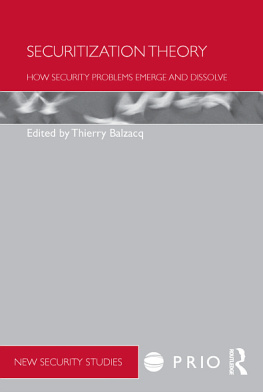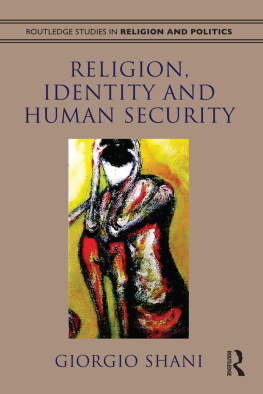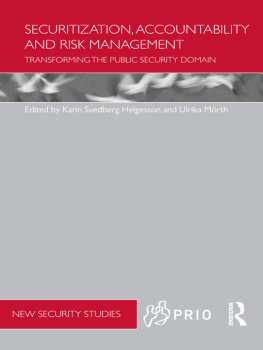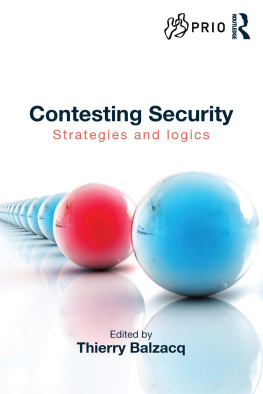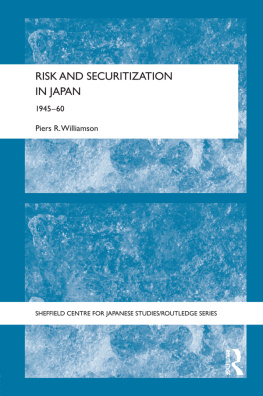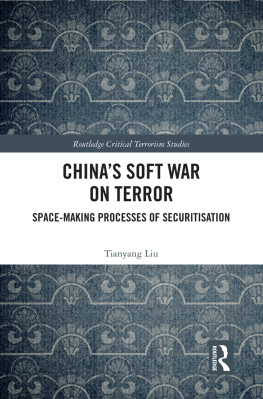Securitization Theory
This volume aims to provide a new framework for the analysis of securitization processes, increasing our understanding of how security issues emerge, evolve and dissolve.
Securitization theory has become one of the key components of security studies and IR courses in recent years, and this book represents the first attempt to provide an integrated and rigorous overview of securitization practices within a coherent framework. To do so, it organizes securitization around three core assumptions which make the theory applicable to empirical studies: the centrality of audience, the co-dependency of agency and context and the structuring force of the dispositif. These assumptions are then investigated through discourse analysis, process-tracing, ethnographic research, and content analysis and discussed in relation to extensive case studies.
This innovative new book will be of much interest to students of securitization and critical security studies, as well as IR theory and sociology.
Thierry Balzacq is holder of the Tocqueville Chair on Security Policies and Professor at the University of Namur. He is Research Director at the University of Louvain and Associate Researcher at the Centre for European Studies at Sciences Po Paris.
Series: PRIO New Security Studies
Series Editor: J. Peter Burgess, PRIO, Oslo
The aim of this series is to gather state-of-the-art theoretical reflexion and empirical research into a core set of volumes that respond vigorously and dynamically to the new challenges to security scholarship.
The Geopolitics of American Insecurity
Terror, power and foreign policy
Edited by Franois Debrix and Mark J. Lacy
Security, Risk and the Biometric State
Governing borders and bodies
Benjamin Muller
Security and Global Governmentality
Globalization, governance and the state
Miguel de Larrinaga and Marc G. Doucet
Critical Perspectives on Human Security
Rethinking emancipation and power in international relations
Edited by David Chandler and Nik Hynek
Securitization Theory
How security problems emerge and dissolve
Edited by Thierry Balzacq
Securitization Theory
How security problems emerge and dissolve
Edited by
Thierry Balzacq

LONDON AND NEW YORK
First published 2011
by Routledge
2 Park Square, Milton Park, Abingdon, Oxon OX14 4RN
Simultaneously published in the USA and Canada
by Routledge
270 Madison Avenue, New York, NY 10016
Routledge is an imprint of the Taylor & Francis Group, an informa business
This edition published in the Taylor & Francis e-Library, 2010.
To purchase your own copy of this or any of Taylor & Francis or Routledges collection of thousands of eBooks please go to www.eBookstore.tandf.co.uk.
2011 Thierry Balzacq for selection and editorial matter,
individual contributors; their contributions
All rights reserved. No part of this book may be reprinted or
reproduced or utilised in any form or by any electronic,
mechanical, or other means, now known or hereafter
invented, including photocopying and recording, or in any
information storage or retrieval system, without permission in
writing from the publishers.
British Library Cataloguing in Publication Data
A catalogue record for this book is available from the British Library
Library of Congress Cataloging-in-Publication Data
Securitization theory: how security problems emerge and
dissolve/edited by Thierry Balzacq.
p. cm.
1. Security, International. 2. National security. I. Balzacq, Thierry.
JZ5588.S4283 2010
355.0330001dc22
2010003574
ISBN 0-203-86850-1 Master e-book ISBN
ISBN13: 9780415556279 (hbk)
ISBN13: 9780415556286 (pbk)
ISBN13: 9780203868508 (ebk)
Contents
THIERRY BALZACQ
|
THIERRY BALZACQ
|
SARAH LONARD AND CHRISTIAN KAUNERT
|
FRED VULTEE
|
C. WILKINSON
|
MARK B. SALTER
|
MARIA JULIA TROMBETTA
|
ROXANNA SJSTEDT
|
HOLGER STRITZEL AND DIRK SCHMITTCHEN
|
JUHA A. VUORI
|
MICHAEL C. WILLIAMS
|
Tables
1.1 | A conceptual map of the speech act |
2.1 | The vocabulary of securitization |
2.2 | A cartography of this volumes methodological commitments |
4.1 | Orientation toward media |
4.2 | Effect of frame and how closely subjects follow security news on trust in government |
4.3 | Effect of frame and how closely subjects follow security news on recognition memory |
5.1 | Establishing trustworthiness: positivist and interpretivist terms |
5.2 | Actors involved in the Peaceful Citizens for Kyrgyzstan Without Crime protest |
Figures
2.1 | Securitization analysis in context |
4.1 | Effect of securitization frame and government orientation on trust in government |
4.2 | Effect of securitization frame and government orientation on recognition memory |
4.3 | Effect of securitization frame and participants media distance, or political orientation relative to the media, on recognition memory |
4.4 | Effect of securitization frame and media distance on trust in government |
Contributors
Thierry Balzacq is holder of the Tocqueville Chair on Security Policies and Professor at the University of Namur. He is Research Director at the University of Louvain and Associate Researcher at the Centre for European Studies at Sciences Po Paris. He specializes on critical approaches to security, IR theories and the external dimensions of EU internal security. His articles have appeared, inter alia, in the European Journal of International Relations, Journal of Common Market Studies, Security Dialogue, Review of International Studies, Cultures&Conflits. His most recent book is The External Dimension of EU Justice and Home Affairs (Palgrave Macmillan, 2009). He is currently working on two projects, one in French titled Thories de la scurit(Under contract with Presses de Sciences Po) and another provisionally titled The Nature and Origins of Security Ideas. Thierry Balzacq has taught at Aberystwyth, Cambridge, and Sciences Po Paris.
Christian Kaunert holds a PhD in International Politics and an MSc in European Politics from the University of Wales Aberystwyth, a BA (Hons) in European Business from Dublin City University, ESB Reutlingen and a BA (Hons) Open University. Dr Kaunert also lectured at the University of Wales Aberystwyth before joining Salford University in January 2007 as Lecturer. In 2004, he was a University Association of Contemporary European Studies (UACES) Research Fellow at the Universit Libre de Bruxelles, Brussels, Belgium, where he examined the role of European Institutions in counter-terrorism and the broader security field. He will be a visiting research fellow at IBEI Barcelona, a joint research institute on international relations for the universities in Barcelona, Spain, from February until September 2010. He has studied, travelled and researched widely in Europe, Asia, and especially Latin America, including one six-month stay in Cali, Colombia, as well as further trips to China, Puerto Rico, and the United States. He is the author of several articles on European counter-terrorism, and wider homeland security matters. His articles have appeared in journals, such as

